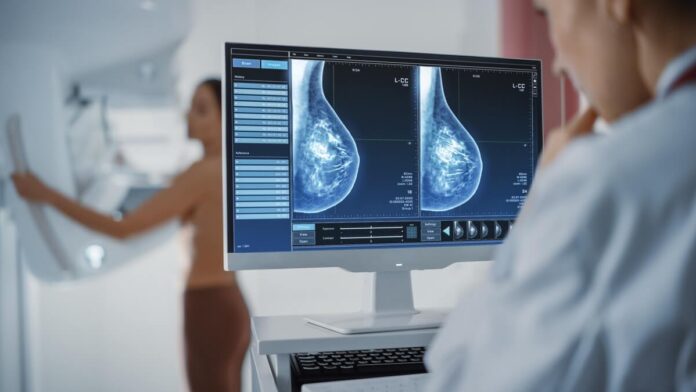Cancer, in all its forms, is still the leading cause of disease burden in Australia, which is why medical experts are calling on everyone to make regular screening part of their routine.
Research from the Australian Institute of Health and Welfare (AIHW) shows cancer has the biggest impact on the nation’s healthcare system, more than any other medical condition.
The data shows that the number of Aussies diagnosed with cancer is set to surpass 200,000 by 2033 and this trend is worrying medical experts.
We’ve all been told the importance of getting regular cancer screenings, but it seems most of us aren’t really listening.
Why aren’t we getting screened?
Professor Jon Emery, from the Victorian Comprehensive Cancer Centre Alliance, says screening rates have dropped in recent years for a number of reasons.
“Overall, there is a general lack of awareness about its importance and the benefits of early detection,” he says
“Access can also be an issue, as some screening programs are limited by a patient’s geographic location, socioeconomic status or cultural and language barriers.”
Depending on the type of cancer you’re screening for, getting tested can also be an uncomfortable and invasive process. Then there’s the rational fear anybody would have – what if the test comes back positive?
“A lot of people don’t test due to a fear of getting a cancer diagnosis; for some there are concerns about the nature of the test itself such as with the yuck factor with the poo kit, pain from a mammogram and the intimate nature of the cervical screening test,” Prof. Emery says.
“Anecdotally, I am hearing that the current cost-of-living crisis is also playing a role as we are seeing more and more people cut back on healthcare essentials to save money,” he continues.
Cost certainly plays a role in many cases. There are federal, state and territory government screening programs for bowel, cervical and breast cancer, but no such programs for other forms of cancer. Even if you are screening for the cancers mentioned, you will need to fit certain age or family history requirements to qualify.
There are, of course, screening tests you can have for other cancers, but these will require a referral from your GP and will only be free if the screening provider bulk-bills.
Pandemic still lingers
Another factor that is still affecting screening rates is the pandemic. Like many things in society, cancer screening rates understandably dropped, and have not rebounded to previous levels since society opened up again.
A report released by Cancer Australia in September 2021 revealed an alarming 8 per cent drop in selected cancer-related diagnostic procedures, which equates to 163,595 fewer services than expected.
In Victoria alone, there were 6600 fewer cancer diagnoses than expected from 2020-2022 due to the drop in screening and diagnostic tests during the pandemic.
“While rates of diagnosis are increasing slowly, we are still experiencing a post-pandemic lag, and cancer screening rates have not fully recovered,” Prof. Emery says.
“Only 41 per cent of people returned a bowel cancer screening kit in 2020-21 and only 50 per cent of women had a screening mammogram in 2021-22.
Survival rates for cancer continue to improve but our growing total population and the proportion living longer means that the total number of deaths from cancer is estimated to have increased by 41 per cent between 2000 and 2023, according to the AIHW. Cancer now accounts for three in every 10 deaths in Australia.
Alison Rossiter, managing director of Roche Diagnostics Australia, says her firm saw a similar shift during the COVID years.
“The pandemic undeniably shifted our approach to healthcare, putting vital cancer screenings on the backburner for too many Australians, and we have not yet recovered,” she says.
“It’s imperative that we address this gap and encourage the community to seek regular screenings across all health conditions – cervical, breast cancer, bowel, PSA for prostate cancer, and liver tests are high on the agenda, as are other essential cancer screenings,” she said.
“Early detection is key to effective treatment and can significantly improve patient outcomes.”
When was the last time you had any cancer screening done? Are there any cancers in particular that you’re worried about? Let us know in the comments section below.
Also read: Different cancers and their treatments explained
Disclaimer: This article contains general information about health issues and is not advice. For health advice, consult your medical practitioner.


Why does breast screening, cervical screening and bowel screening stop at the age of 74?
My thoughts are that, except for maybe cervical screening, that breast and bowel are more likely post age 74.
My thoughts exactly. I’ve had the bowel test a number of times until I reached 74 – and then for no apparent reason, no more testing. I wonder why …
FCM it stops at 74 because that is the age when it is no longer free. We can always request to be screened, particularly if you have issues when those screenings – may – be free: e.g. I had breast implants that were decimated in a bad car crash and there is silicone all through my right breast (was a passenger in the vehicle) and it is very hard for the specialists to determine if there is underlying suspicion of cancer. I have been advised any screening would be free as it now stands.